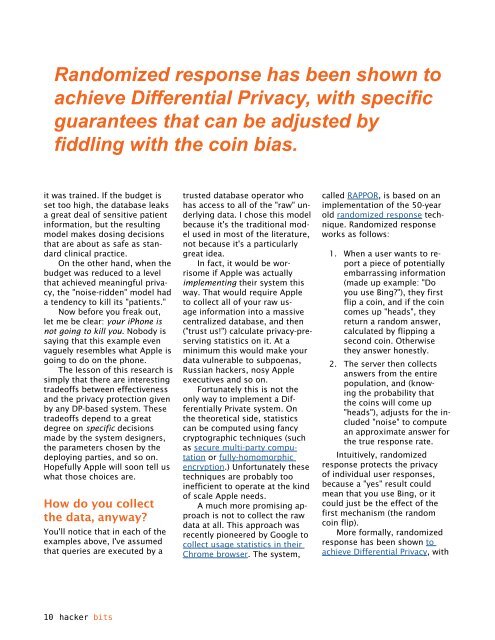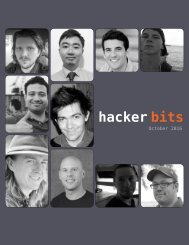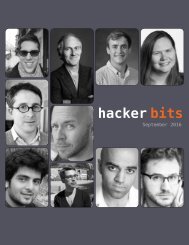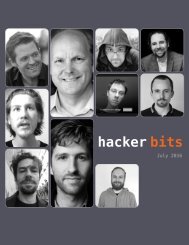Hacker Bits, August 2016
HACKER BITS is the monthly magazine that gives you the hottest technology stories crowdsourced by the readers of Hacker News. We select from the top voted stories and publish them in an easy-to-read magazine format. Get HACKER BITS delivered to your inbox every month! For more, visit https://hackerbits.com/2016-08.
HACKER BITS is the monthly magazine that gives you the hottest technology stories crowdsourced by the readers of Hacker News. We select from the top voted stories and publish them in an easy-to-read magazine format.
Get HACKER BITS delivered to your inbox every month! For more, visit https://hackerbits.com/2016-08.
Create successful ePaper yourself
Turn your PDF publications into a flip-book with our unique Google optimized e-Paper software.
Randomized response has been shown to<br />
achieve Differential Privacy, with specific<br />
guarantees that can be adjusted by<br />
fiddling with the coin bias.<br />
it was trained. If the budget is<br />
set too high, the database leaks<br />
a great deal of sensitive patient<br />
information, but the resulting<br />
model makes dosing decisions<br />
that are about as safe as standard<br />
clinical practice.<br />
On the other hand, when the<br />
budget was reduced to a level<br />
that achieved meaningful privacy,<br />
the "noise-ridden" model had<br />
a tendency to kill its "patients."<br />
Now before you freak out,<br />
let me be clear: your iPhone is<br />
not going to kill you. Nobody is<br />
saying that this example even<br />
vaguely resembles what Apple is<br />
going to do on the phone.<br />
The lesson of this research is<br />
simply that there are interesting<br />
tradeoffs between effectiveness<br />
and the privacy protection given<br />
by any DP-based system. These<br />
tradeoffs depend to a great<br />
degree on specific decisions<br />
made by the system designers,<br />
the parameters chosen by the<br />
deploying parties, and so on.<br />
Hopefully Apple will soon tell us<br />
what those choices are.<br />
How do you collect<br />
the data, anyway?<br />
You'll notice that in each of the<br />
examples above, I've assumed<br />
that queries are executed by a<br />
trusted database operator who<br />
has access to all of the "raw" underlying<br />
data. I chose this model<br />
because it's the traditional model<br />
used in most of the literature,<br />
not because it's a particularly<br />
great idea.<br />
In fact, it would be worrisome<br />
if Apple was actually<br />
implementing their system this<br />
way. That would require Apple<br />
to collect all of your raw usage<br />
information into a massive<br />
centralized database, and then<br />
("trust us!") calculate privacy-preserving<br />
statistics on it. At a<br />
minimum this would make your<br />
data vulnerable to subpoenas,<br />
Russian hackers, nosy Apple<br />
executives and so on.<br />
Fortunately this is not the<br />
only way to implement a Differentially<br />
Private system. On<br />
the theoretical side, statistics<br />
can be computed using fancy<br />
cryptographic techniques (such<br />
as secure multi-party computation<br />
or fully-homomorphic<br />
encryption.) Unfortunately these<br />
techniques are probably too<br />
inefficient to operate at the kind<br />
of scale Apple needs.<br />
A much more promising approach<br />
is not to collect the raw<br />
data at all. This approach was<br />
recently pioneered by Google to<br />
collect usage statistics in their<br />
Chrome browser. The system,<br />
called RAPPOR, is based on an<br />
implementation of the 50-year<br />
old randomized response technique.<br />
Randomized response<br />
works as follows:<br />
1. When a user wants to report<br />
a piece of potentially<br />
embarrassing information<br />
(made up example: "Do<br />
you use Bing?"), they first<br />
flip a coin, and if the coin<br />
comes up "heads", they<br />
return a random answer,<br />
calculated by flipping a<br />
second coin. Otherwise<br />
they answer honestly.<br />
2. The server then collects<br />
answers from the entire<br />
population, and (knowing<br />
the probability that<br />
the coins will come up<br />
"heads"), adjusts for the included<br />
"noise" to compute<br />
an approximate answer for<br />
the true response rate.<br />
Intuitively, randomized<br />
response protects the privacy<br />
of individual user responses,<br />
because a "yes" result could<br />
mean that you use Bing, or it<br />
could just be the effect of the<br />
first mechanism (the random<br />
coin flip).<br />
More formally, randomized<br />
response has been shown to<br />
achieve Differential Privacy, with<br />
10 hacker bits















